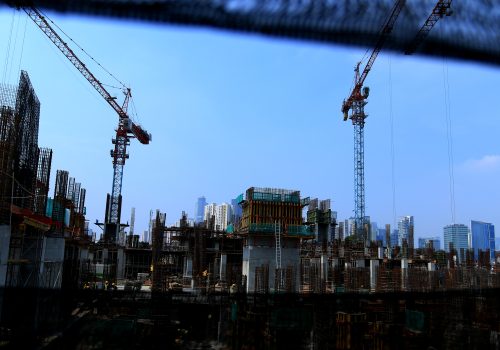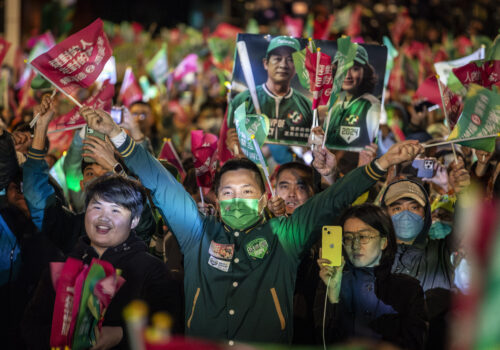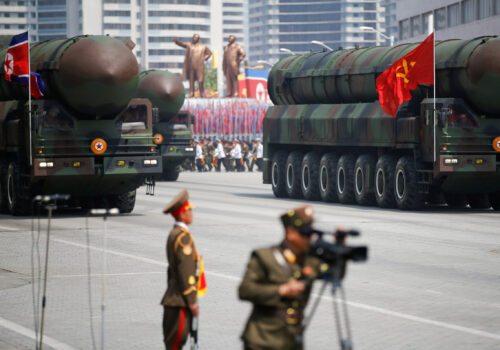Who will lead Indonesia after Jokowi? The world’s third-largest democracy is about to decide.
In 2024, elections are everywhere all at once. Dozens of countries, stretching from Mexico to the Solomon Islands, are holding crucial contests, including the world’s three largest democracies, India, Indonesia, and the United States. Between rising authoritarianism, growing institutional mistrust, and rapid spread of artificial intelligence, these elections are set to present a cumulative stress test on democracy worldwide.
Already the fourth-largest country by population, Indonesia is projected to become the world’s sixth-largest economy by 2027 and an increasingly important geopolitical player to match its size and wealth. Thus, the outcomes of its February 14 presidential and legislative contests carry far-reaching implications for the future not only of the country host to the world’s largest Muslim population, but also of Southeast Asia and the world.
The electorate: millennials and Gen Z on the rise
With more than two hundred million eligible voters, Indonesia’s massive electorate appropriately reflects its sprawling geography, stretching 3,200 miles from its easternmost to westernmost points. This makes electoral administration a logistically complex affair, with ballots cast at more than eight hundred thousand polling stations across the country’s six thousand inhabited islands.
The most recent nation-wide elections were held in 2019, when 80 percent of eligible voters turned out to re-elect incumbent President Joko Widodo, popularly known as “Jokowi.” In the five years since, millions of young people have reached voting age, joining an already young electorate, in which 50 percent of eligible voters are classified as millennials or Gen Z.
The issues: policy matters, but personalities drive politics
With more than 1.7 million people entering the workforce annually, economic development and job creation are unsurprisingly atop the list of voters’ policy priorities, both of which Jokowi has been laser–focused on during his two terms in office. Foreign affairs issues are also on voters’ radars, as reflected by the January 7 presidential debate dedicated to them. Among other subjects, the candidates debated Indonesia’s place in the world, geopolitics, and the Israeli-Palestinian conflict.
That said, voter behavior is ultimately driven by personalities, not policies. In a December survey from Lembaga Survei Indonesia, respondents were asked to state their reasons for choosing to support a presidential candidate. Their responses overwhelmingly reflected interpersonal dynamics, such as experience, leadership ability, and trustworthiness, whereas policy issues barely registered.
On the ballot: the presidency and more than 20,000 other elected positions
Naturally, the presidential race is receiving the lion’s share of attention from voters and the media. Under the Indonesian constitution, the president is limited to two terms in office. Thus, Jokowi cannot run for re-election, and three high-profile figures are vying to succeed him: Prabowo Subianto, Ganjar Pranowo, and Anies Baswedan. Each are paired with a vice presidential running mate: Prabowo with Gibran Rakabuming Raka, Ganjar with Mahfud MD, and Anies with Muhaimin Iskandar.
Alongside this, voters will cast ballots for all 580 members of the House of Representatives (DPR), the lower house of the national legislature; 2,372 members of provincial legislatures (DPRDs); 17,510 members of regency and city DPRDs; and all 152 members of the Regional Representative Council, the upper house of the national legislature. All legislative candidates run under the banner of one of the twenty-four political parties contesting the election, eighteen of which are national in scope.
The electoral process: complex, free, and fair
Ballots, especially those from far-flung islands, can take days to count. Official results are scheduled to be released more than a month after the election, on March 20. On election day, quick counts and exit polls will provide helpful, but not necessarily perfect, barometers. The 2019 election was the first in which presidential and legislative ballots were cast on the same day, and the administrative burden it put on election workers contributed to hundreds dying from exhaustion—a tragic outcome that administrators are seeking to avoid repeating.
Indonesian elections are broadly seen as free and fair. Historically, candidates and parties have ultimately accepted the results, albeit sometimes after tense hand-wringing that can turn violent. After losing the 2014 and 2019 elections, Prabowo contested the results in court, and the aftermath of the 2019 elections saw riots in Jakarta during which several people were killed.
The presidential candidates: a study in contrasts
Prabowo, the frontrunner, currently serves as the minister of defense. He is backed by a coalition of eight national parties, led by Gerindra, for which he serves as general chairman. Having run against Jokowi in 2014 and 2019, this is his third campaign for the top job. This time around, Prabowo is seen as tacitly backed by Jokowi and is framing his candidacy as a de-facto continuation of the incumbent’s presidency.
A retired lieutenant general, Prabowo symbolizes the resurgence of Suharto-era and military-aligned figures. He displays a fierce nationalism—a potent factor in Indonesian politics—and faced credible accusations of human rights violations during his military career. To inoculate against this, he has worked to change his image, especially among young voters. As two correspondents in Southeast Asia recently put it, he’s rebranding himself as “a cute grandpa with awkward dance moves and a softer side.”
Ganjar, who served as the governor of Central Java until last September, is backed by a coalition of four national parties that is led by Indonesia’s largest, the Indonesian Democratic Party of Struggle (PDIP). Elected as governor in 2013, he built a national profile and came to be seen as a politician in the mold of Jokowi. Some expected the president to endorse Ganjar, but this did not happen, partially due to an apparent breakdown in Jokowi’s relationship with Megawati Sukarnoputri, PDIP’s chair.
A former two-term DPR member, Ganjar has sought to project an “everyman” image and play up his humble beginnings. He is charismatic and knows how to play to the cameras; qualities that some of his critics argue mask a lack of policy depth. His focus on grassroots events and spontaneous public appearances emulate Jokowi’s well-known blusukans, or “unscheduled visits,” albeit in a manner that PDIP’s secretary general insists are blusukan plus.
Anies, who served as the governor of Jakarta until 2022, is backed by a coalition of four smaller national parties. Elected as governor in 2017, he leveraged his country’s most prominent governorship to build a national profile that he hopes to use as a launching pad to the presidency, much as Jokowi did in 2014. Anies has sought to position himself as the candidate of choice for voters who desire change.
A former university rector who served as minister of education and culture in Jokowi’s first cabinet, Anies projects a studious, policy-minded image. While he controversially drew support from hardline Islamists during his first campaign for governor—much as Prabowo did in 2014 and 2019—Anies has sought to moderate his image, appeal to young voters, and play to “his image as an intellectual and an Islamic scholar.”
The campaign: Will there be a runoff?
With just days to go until the election, a lot can and will happen. On policy, there isn’t a lot of daylight between the candidates, who have sought to differentiate themselves more on the basis of image and personality. But there certainly are some differences. According to recent polls, Prabowo holds a commanding lead, but is falling just short of winning the outright majority required to avoid a runoff, while Anies and Ganjar are locked in a tight contest for second place.
In the event of a runoff, Prabowo will start as the favorite to win and may benefit from institutional support. It will be competitive, though, if Anies and Ganjar unite behind whichever of the two advances to face Prabowo. As the old adage goes, a week is a long time in politics, and the time between now and a runoff election would be an eternity. The intrigue, twists, and turns that characterize Indonesian politics will surely make for a fascinating election.
Parker Novak is a nonresident fellow with the Atlantic Council’s Global China Hub and Indo-Pacific Security Initiative, where he specializes in Southeast Asia, the Pacific Islands, Indo-Pacific geopolitics, and US foreign policy. He previously served as the Indonesia and Timor-Leste country director for an international non-governmental organization.
Further reading
Thu, Aug 31, 2023
Indonesia’s economy will surpass Russia’s sooner than expected. Here’s what that says about the global economy.
Econographics By Josh Lipsky, Niels Graham
In 2026, Indonesia is expected to surpass Russia to become the world’s sixth largest economy
Mon, Jan 22, 2024
Lai’s victory isn’t the full story. Here are five deeper takeaways from Taiwan’s election.
New Atlanticist By Lev Nachman, Wen-Ti Sung
The January 13 election in Taiwan revealed which political parties hold the strongest hands, what’s next for the legislature, and how China might respond.
Wed, Jan 31, 2024
A US-South Korea alliance strategic memo on deterrence
Issue Brief By Markus Garlauskas, Lauren D. Gilbert
With North Korea’s rapidly advancing military technology, aggressive nuclear policy changes, and deepening ties with the PRC making deterrence on the Korean Peninsula increasingly more complex, this is how the US and South Korea can shore up cooperative deterrence and boost alliance resilience.
Image: Three presidential candidates, Anies Baswedan (R), Prabowo Subianto (C), and Ganjar Pranowo (L), are posing for photos after the first presidential candidate debate at the General Election Commission (KPU) office in Jakarta, Indonesia, on December 12, 2023. Indonesia is preparing to hold general elections for president and vice president for the 2024-2029 period in February 2024. (Photo by Aditya Irawan/NurPhoto)


